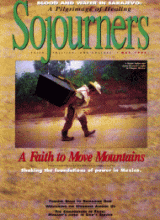Space and voice are powerful. Although the church is called to be a sanctuary of safe space where Christians listen carefully to one another, it often is not. Those who do not identify with the dominant culture or prevailing theology frequently feel neither safe, valued, or heard in most churches.
Ecumenical feminists/womanists regularly challenge churches to provide opportunity for women to express the rich variety of their concerns and perspectives, a call at the heart of the World Council of Churches' Ecumenical Decade: Churches in Solidarity With Women. The number of women is increasing in places where theology is created and transmitted and where churches are governed. But in such settings, we often feel like sisters in brother-land, foreigners in someone else's territory.
Whether or not churches meet the challenge of facilitating space and voice, Christian women repeatedly demonstrate remarkable ingenuity and perseverance in creating small and large places where we can be ourselves, affirming each other and our faith together.
The now famous November 1993 conference on Re-Imagining, held in Minneapolis in conjunction with the Ecumenical Decade, was quite different from most I attend precisely because it stretched participants into space unexplored by most. The gathering empowered the multiplicity of Christian women's voices in both choruses and cacophonies of concerns and perspectives we had not heard in quite the same way.
This kind of freedom for women sometimes frightens or startles other Christians. With few boundaries to define and confine us, women sometimes even startle ourselves. When we do, we usually step back, try to rearrange the space to make it more comfortable for everyone, invite voices with different perspectives to speak up, and include those who previously felt marginalized.
Read the Full Article
